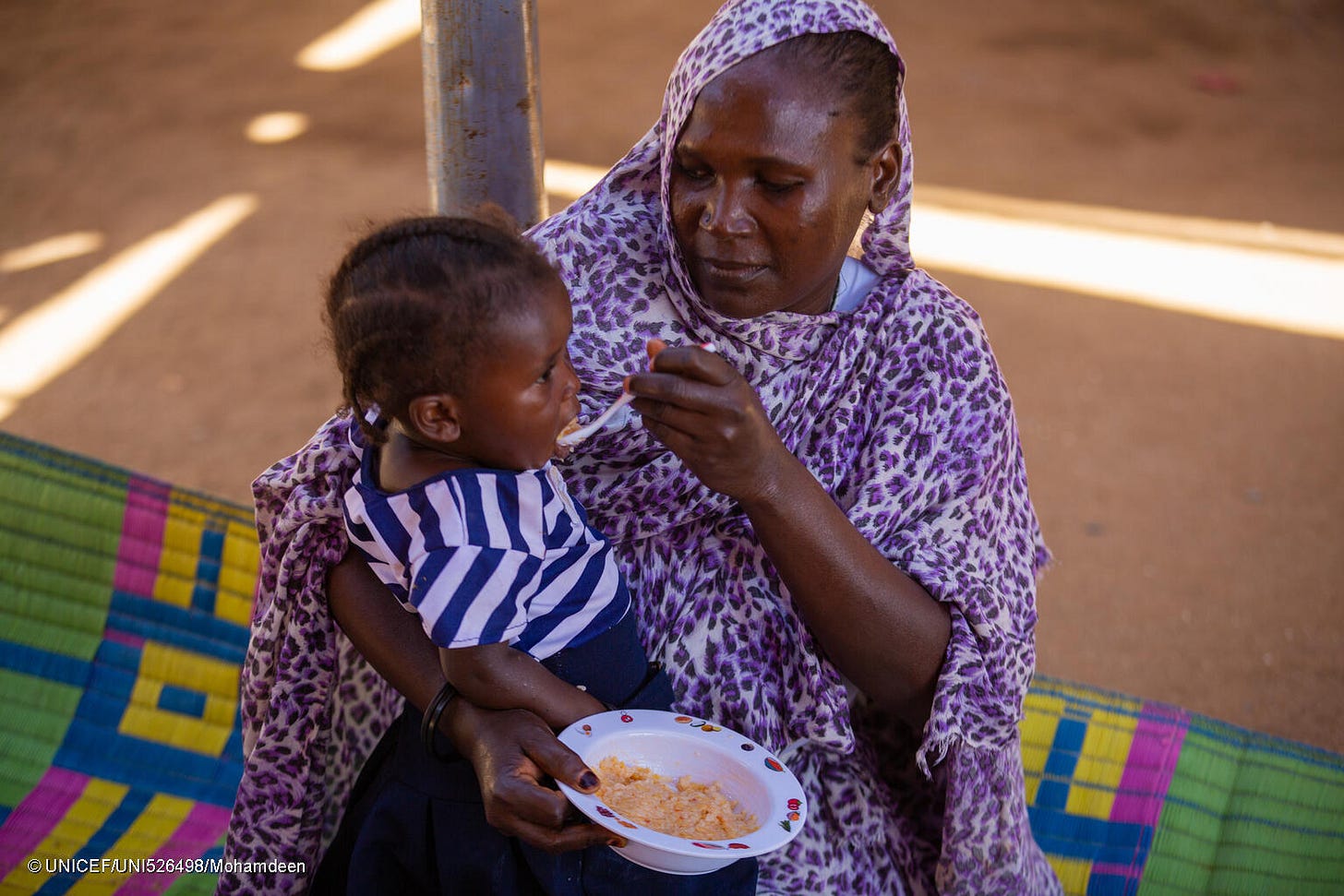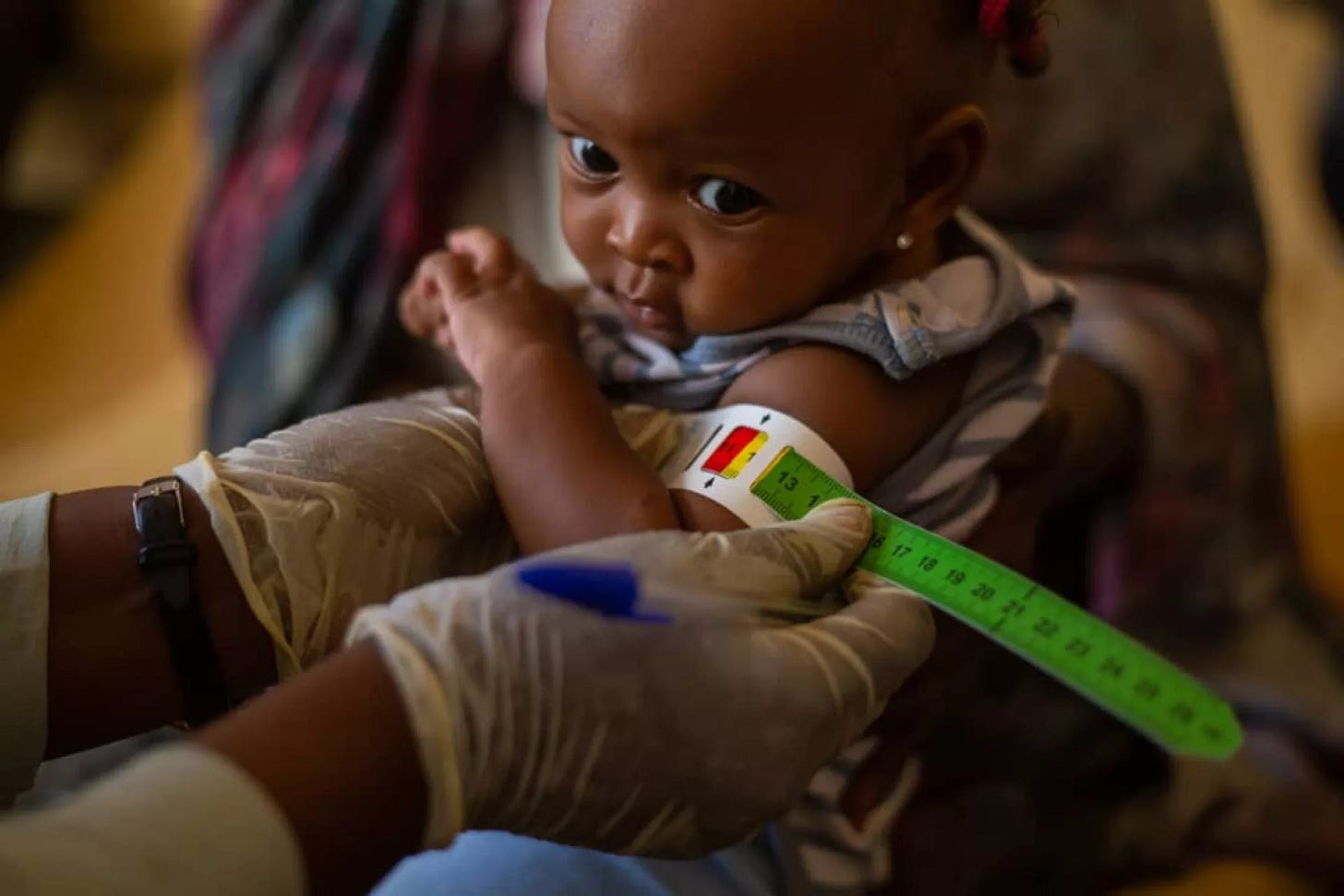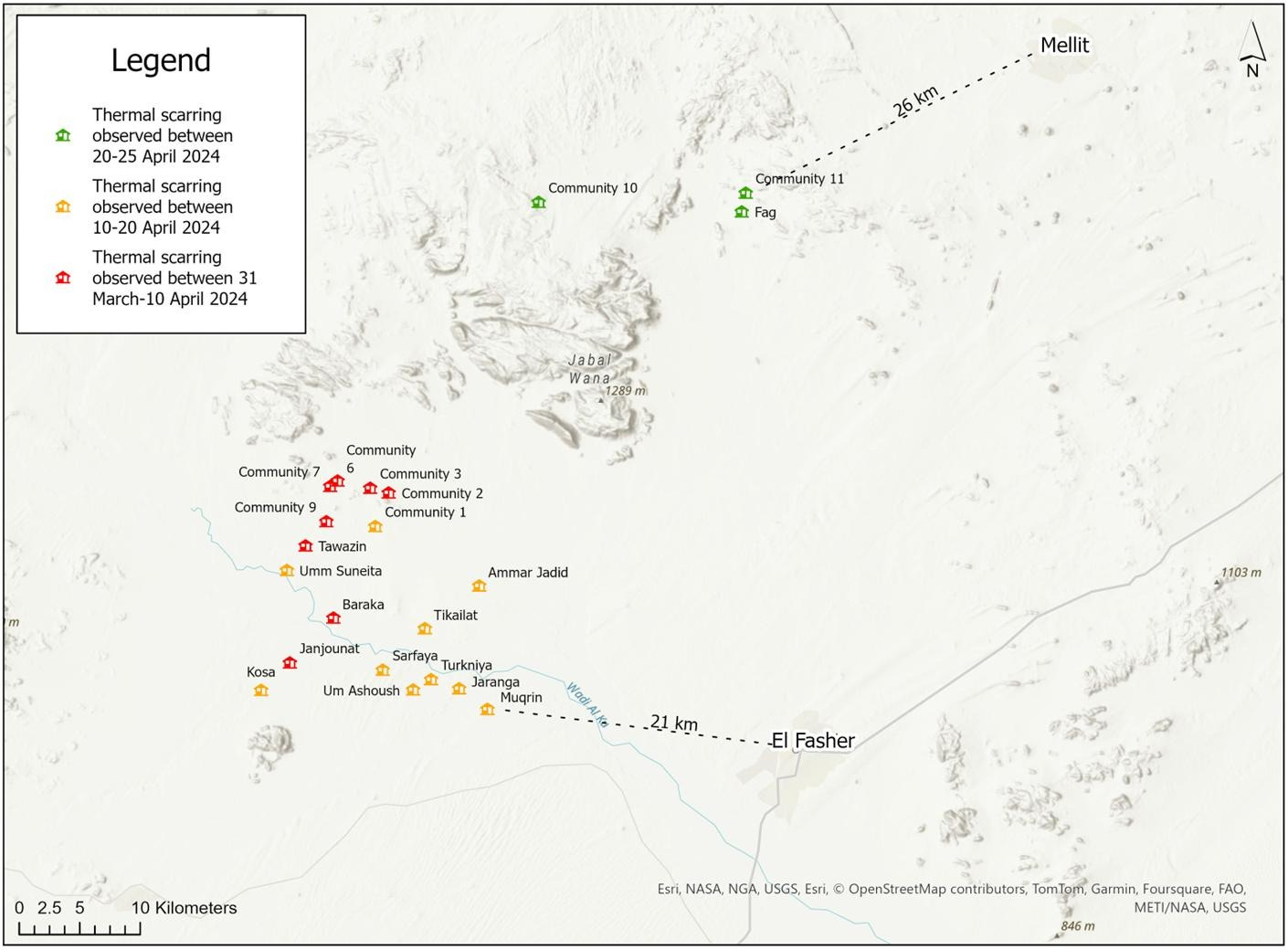Hunger deepens throughout war-torn Sudan
Plus: Russia recognizes the junta, Chad affirms neutrality
Sudanese are resorting to increasingly desperate measures amid a deepening food crisis throughout the country. A new report by Reuters today details some of the coping mechanisms, including eating dirt, boiling leaves, hunting cats or birds, selling valuables, and cooking with seeds that are needed for the next planting season.
The collapse of the national economy means that vulnerable people are going hungry throughout the country, though the worst-hit areas are those where fighting is ongoing—especially Khartoum and Darfur—and places hosting war-displaced people.
Reuters points out that it’s not only the poor who are going hungry: “In middle class neighborhoods of Khartoum, life has become a daily battle for survival, defined by hunger and fear, as people find themselves pincered between the military and RSF.”
“For Lina Mohammed Hassan and her family, starvation set in slowly. After the war broke out last year, mortars rained down around Hassan’s home in the Banat neighborhood of Omdurman… Soon, Hassan and her extended family of 11 were surviving largely on a diet of lentils and rice. ‘Even that was hard to get because prices were five times the normal rate,’ she said.”
Eventually, Lina and the other adults began skipping meals, sometimes for two days straight, so the children could eat. They began eating tree leaves boiled in water and sprinkled with spices. “We tried to avoid picking the leaves from poisonous trees,” she said. “We only used the mango, lemon and guava leaves. The children would eat them. They couldn’t say no because they were so hungry.”
As the fighting continues, more and more farms and businesses are failing, more roads and markets are disrupted, and many thousands of men are pulled away from productive economic tasks into the ranks of the warring parties.
The latest mass displacement took place in North Darfur, where the Rapid Support Forces (RSF) attacked villages around El Fasher and Melit earlier this month. In a new investigation published Monday, the Humanitarian Research Lab at the Yale School of Public Health detailed 22 communities razed in the state over the past month, including 19 northwest of EL Fasher and three west of Melit.
They based this assessment is based on Sentinel satellite imagery, NASA infrared data (VIIRS), and open source reporting.
The Yale researchers further warned that a “mass casualty event” could take place if the RSF attack El Fasher, the state capital, as they have been threatening to do. This would cause deaths in three ways:
Deprivation-related deaths from lack of basic necessities (food, water, medical assistance), noting that this is “already occurring and widespread”;
Civilian deaths from crossfire between armed actors; and
Civilian deaths from “targeted mass atrocity events.”
The report stated, “A large-scale RSF multidirectional siege and battle for El-Fasher would have severe consequences for civilians in El-Fasher. SAF (the Sudan Armed Forces) is deploying airstrikes in an indiscriminatory manner, and both RSF and SAF have deployed artillery and heavy munitions without sufficient protection of civilians. Civilian death from mass atrocity events is also a major concern…”
“RSF typically infiltrates neighborhoods in waves and conducts widespread and targeted mass atrocities including mass executions, often of Masalit, Fur, and Zaghawa men and boys, sexual and gender-based violence toward women and girls, and systematically razing communities.”
For its part, the RSF says it is acting only in self-defense, accusing the army and allies of carrying out 22 recent attacks against it. The paramilitary’s official media channels published a video today in which an unidentified commander said “We didn’t attack anyone. All of the residents of northeast El Fasher were displaced, caused by heavy artillery and airstrikes and violations. They [SAF] are attacking residents even at night.”
Russian delegation signals support for Sudan’s junta
A delegation headed by Russian Deputy Foreign Minister Mikhail Bogdanov visited Sudan on Monday in a signal of support for the Sudanese army, despite earlier reports that Russia’s state-linked Wagner military corporation had supported the rival RSF.
Bogdanov, also a special representative for the Middle East and Africa, met Sudanese army commander Abdel Fattah al-Burhan in the Red Sea City of Port Sudan, a base for the army and government officials since the RSF took over large parts of the capital Khartoum early in the conflict.
Quoting the Russian envoy, state-run news agency SUNA reported, “Bogdanov stressed that Russia is dealing with the Transitional Sovereignty Council and the government in Port Sudan as the legitimate representative of the Sudanese people in international dealings. His Excellency indicated that the Russian Embassy carries out its work normally through its ambassador from Port Sudan, and in return, the Sudanese ambassador in Moscow carries out his work.”
“Bogdanov stressed the importance of this meeting to enhance consultation and joint cooperation between the two countries and develop aspects of joint cooperation.”
There has been uncertainty around Russia's allegiances in Sudan due to its ties with RSF commander Mohamed Hamdan Dagalo, known as Hemedti, who visited Moscow on the eve of Russia's invasion of Ukraine in 2022.
Prior to the war and in the early months of it, Wagner delivered some weapons to the RSF, and engaged in the gold trade and online disinformation operations. However, Wagner’s involvement dropped off after its short-lived rebellion in Russia last July, and the group said that it was no longer operating in Sudan.
In the meantime, Sudan’s military regime has turned to Russia for fuel, after the RSF took control of its main refinery on the outskirts of Khartoum. As reported by Reuters, Russia began deliveries of diesel to Sudan earlier this month.
Warming relations between Moscow and the Sudanese military junta place the latter in the unusual position of now having friendly ties with both Russia and Ukraine.
Chad accuses Sudan of supporting rebels
Chadian Foreign Minister Mahamat Saleh Annadif spoke with the Al-Jazeera Mubashar television program about the war in Sudan, denying involvement in Sudan’s civil war while simultaneously accusing Sudan of supporitng Chadian rebels.
He said, “I will tell you, although they are accusing us, we have evidence that they are supporting armed Chadian opposition movements in Port Sudan and other places, even though we are not doing anything against them.”
Annadif referred to several historical efforts by past Sudanese government to carry out regime change in Sudan.
Several top Sudanese officials have accused Chad of supporting the RSF and letting the United Arab Emirates use Chadian territory to facilitate arms transfers to the RSF.
Asked specifically about Chad’s alleged support for the RSF, he described this as unsubstantiated rumors: “We challenge any Sudanese official who proves our involvement in the fighting between the army and the rapid support.”
Asked whether the military junta headed by Lt Gen Abdel Fattah al-Burhan is “illegitimate or legitimate, he replied, “The Sudanese should answer this question. I will not answer it. We received Al-Burhan as the president [of the sovereignty council], Hemedti as the deputy, now there is a problem between them… we wish to resolve the problem between them. Whether they are legitimate or illegitimate is not my issue.” Al-Burhan removed Hemedti as his deputy last year, so it’s noteworthy that Annadif referred to him as the deputy (of the Sovereignty Council).
Annadif added that they would deal with both fighting parties in Sudan neutrally and support any peaceful solution to stop the war. “We do not believe in a military solution to the crisis in Sudan, and both combatants must sit down for a dialogue,“ he said, adding that Chad would be ready at any time to host peace talks between Al-Burhan and Hemedti. Annadif also expressed support for the Jeddah platform, saying he had spoken with the Saudi foreign minister about the situation in Sudan.
He emphasized the welcome that Chad has provided to Sudanese refugees, opening up their schools and hospitals. “We are the people and the government most affected by the events in Sudan,” he said, referring to the large refugee population hosted in the country, the long shared border, and shared tribes that live in both countries.
News in Brief
The UAE and the United Kingdom are engaged in a diplomatic spat after UK diplomats allegedly failed to defend the UAE at the UN Security Council against allegations of supporting the RSF. In the latest development, emirate officials snubbed London’s mayor by cancelling meetings on green finance. Earlier, emirate officials had canceled meetings with UK minister, The Times reported.
Former head of military intelligence during the Bashir regime, retired Lt Col Mustafa Mohamed Mohamed, addressed troops and new recruits in Al-Fau, April 29, Though wearing civilian clothes and not in uniform, his visit to the frontline demonstrates the involvement of former regime figures in the ongoing war effort.
SAF claimed to have carried out a succesful assault in the Al-Shajara area of southwest Khartoum on an RSF position on Sunday, April 28, 2024, releasing the below video via the official military channels. SAF troops in that area have been surrounded since mid last year. Fighting is now characterized by house by house combat in a now mostly depopulated part of the city.
RSF claimed the defection of a group of JEM in Gereida Locality, South Darfur. Additionally, they claimed the allegiance of a commander of the Revolutionary Awakening Council led by Musa Hilal.
Armed members of the Justice and Equality Movement allegedly verbally and physically assaulted journalist Azza Aira in Port Sudan, according to the Sudanese Journalists Syndicate.




